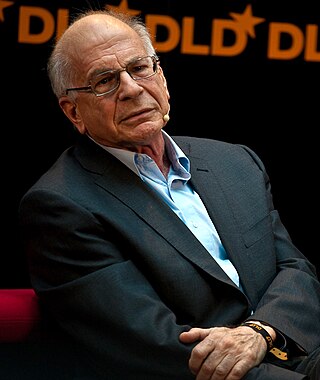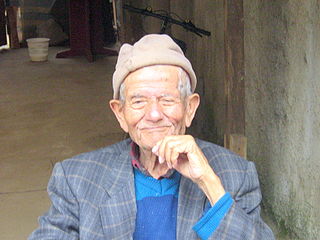Related Research Articles
Quality of life (QOL) is defined by the World Health Organization as "an individual's perception of their position in life in the context of the culture and value systems in which they live and in relation to their goals, expectations, standards and concerns".

Daniel Kahneman is an Israeli-American author, psychologist and economist notable for his work on hedonic psychology, psychology of judgment and decision-making. He is also known for his work in behavioral economics, for which he was awarded the 2002 Nobel Memorial Prize in Economic Sciences. His empirical findings challenge the assumption of human rationality prevailing in modern economic theory.

Happiness is a positive and pleasant emotion, ranging from contentment to intense joy. Moments of happiness may be triggered by positive life experiences or thoughts, but sometimes it may arise from no obvious cause. The level of happiness for longer periods of time is more strongly correlated with levels of life satisfaction, subjective well-being, flourishing and eudaimonia. In common usage, the word happy can be an appraisal of those measures themselves or as a shorthand for a "source" of happiness. As with any emotion, the precise definition of happiness has been a perennial debate in philosophy.
Positive psychology studies the conditions that contribute to the optimal functioning of people, groups, and institutions. It studies "positive subjective experience, positive individual traits, and positive institutions... it aims to improve quality of life."

Economic materialism can be described as either a personal attitude that attaches importance to acquiring and consuming material goods or as a logistical analysis of how physical resources are shaped into consumable products.

The Satisfaction with Life Index was created in 2007 by Adrian G. White, an analytic social psychologist at the University of Leicester, using data from a metastudy. It is an attempt to show life satisfaction in different nations.
The economics of happiness or happiness economics is the theoretical, qualitative and quantitative study of happiness and quality of life, including positive and negative affects, well-being, life satisfaction and related concepts – typically tying economics more closely than usual with other social sciences, like sociology and psychology, as well as physical health. It typically treats subjective happiness-related measures, as well as more objective quality of life indices, rather than wealth, income or profit, as something to be maximized.
The Easterlin paradox is a finding in happiness economics formulated in 1974 by Richard Easterlin, then professor of economics at the University of Pennsylvania, and the first economist to study happiness data. The paradox states that at a point in time happiness varies directly with income both among and within nations, but over time happiness does not trend upward as income continues to grow: while people on higher incomes are typically happier than their lower-income counterparts at a given point in time, higher incomes don't produce greater happiness over time. One explanation is that my happiness depends on a comparison between my income and my perceptions of the average standard of living. If everyone's income increases, my increased income gives a short boost to my happiness, since I do not realize that the average standard of living has gone up. Some time later, I realize that the average standard of living has also gone up, so the happiness boost produced by my increased income disappears. It is the contradiction between the point-of-time and time series findings that is the root of the paradox: while there is a correlation at a fixed point, there is no trend over multiple points. That is, in the short run, everyone perceives increases in income to be correlated with happiness and tries to increase their incomes. However, in the long run, this proves to be an illusion, since everyone's efforts to raise standards of living lead to increasing averages, leaving everyone in the same place in terms of relative income. Various theories have been advanced to explain the Paradox, but the Paradox itself is solely an empirical generalization. The existence of the paradox has been strongly disputed by other researchers.
Contentment is a state of being where one is satisfied with their current situation, and the state of affairs in one’s life as they presently are. If one is content, they are pleased with their situation and how the elements in one’s life are situated. Contrary to popular belief, it is possible to be content with one’s life regardless of the circumstance, regardless of whether things are going as one expected or not.
Edward Francis Diener was an American psychologist and author. Diener was a professor of psychology at the University of Utah and the University of Virginia, and Joseph R. Smiley Distinguished Professor Emeritus at the University of Illinois, as well as a senior scientist for the Gallup Organization. He is noted for his research over the past thirty years on happiness, including work on temperament and personality influences on well-being, theories of well-being, income and well-being, cultural influences on well-being, and the measurement of well-being. As shown on Google Scholar as of April 2021, Diener's publications have been cited over 257,000 times.
Ikigai is a Japanese concept referring to something that gives a person a sense of purpose, a reason for living.

The trait of extraversion and introversion are a central dimension in some human personality theories. The terms introversion and extraversion were introduced into psychology by Carl Jung, though both the popular understanding and current psychological usage are not the same as Jung's original concept. Extraversion tends to be manifested in outgoing, talkative, energetic behavior, whereas introversion is manifested in more reflective and reserved behavior. Jung defined introversion as an "attitude-type characterised by orientation in life through subjective psychic contents", and extraversion as "an attitude-type characterised by concentration of interest on the external object".
Robert Biswas-Diener is a positive psychologist, author and instructor at Portland State University. Biswas-Diener's mother is Carol Diener and his father is Ed Diener, both psychologists.
Life satisfaction is the evaluation of a person's quality of life. It is assessed in terms of mood, relationship satisfaction, achieved goals, self-concepts, and self-perceived ability to cope with life. Life satisfaction involves a favorable attitude towards one's life—rather than an assessment of current feelings. Life satisfaction has been measured in relation to economic standing, degree of education, experiences, residence, and other factors.
Subjective well-being (SWB) is a self-reported measure of well-being, typically obtained by questionnaire.

Michael W. Fordyce was an American psychologist and a pioneer researcher in the field of empirical happiness measurement and intervention. As a forerunner who approached "happiness" as an applied science, he ushered-in the modern academic branch of Positive Psychology
The World Database of Happiness is a web-based archive of research findings on subjective appreciation of life, based in the Erasmus Happiness Economics Research Organization of the Erasmus University Rotterdam in The Netherlands. The database contains both an overview of scientific publications on happiness and a digest of research findings. Happiness is defined as the degree to which an individual judges the quality of his or her life as a whole favorably. Two 'components' of happiness are distinguished: hedonic level of affect and contentment.
Aversion to happiness, also called fear of happiness, is an attitude towards happiness in which individuals may deliberately avoid experiences that invoke positive emotions or happiness. Aversion to happiness is not a recognized mental health disorder on its own, but it can contribute to and/or exacerbate existing mental health issues.

Jan-Emmanuel De Neve is a Belgian economist and professor at the University of Oxford where he directs the Wellbeing Research Centre. De Neve is also the KSI Fellow and Vice-Principal of Harris Manchester College. He is best known for his research on the economics of wellbeing which has led to new insights into the relationship between wellbeing and income, productivity, firm performance, and economic growth. De Neve is also an editor of the World Happiness Report and co-founder of the World Wellbeing Movement.
The Journal of Happiness Studies: An Interdisciplinary Forum on Subjective Well-Being is a peer-reviewed interdisciplinary scientific journal covering the study of happiness and well-being. It was established in 2000 by founding editors Ed Diener, Alex Michalos, and Ruut Veenhoven. It is published by Springer Science+Business Media, and is affiliated with the International Society for Quality of Life Studies (ISQOLS). The editor-in-chief is Antonella Delle Fave. According to the Journal Citation Reports, the journal has a 2020 impact factor of 3.852.
References
- ↑ Rojas, Mariano (2007-06-01). "Inspiring Economics". Journal of Happiness Studies. 8 (2): 293–98. doi:10.1007/s10902-007-9048-3. S2CID 147561805.
- ↑ Chekola, Mark (2009-10-01). "An Entertaining Travelogue". Journal of Happiness Studies. 10 (5): 631–33. doi:10.1007/s10902-009-9136-7. S2CID 143216442.
- ↑ Frisch, Michael. "Professor". The meaningful life project. Frisch, Michael B. (2008). The Oral History and Education Project of the International Society for Quality of Life Studies and the Gallup Institute for Global Well Being: A Way to Honor Distinguished Researchers and to Preserve their Legacies. Applied Research in Quality of Life, 2 (4), 223–38. Retrieved 2013-05-22.
- ↑ OECD, 2nd world forum. "Measuring and fostering the progress of societies". Measures of Gross National Happiness. oecd. Retrieved 2013-05-22.
{{cite web}}: CS1 maint: numeric names: authors list (link) - ↑ Ban, Ki-moon. "Happiness: towards a holistic approach to development". Sixty-seventh session Agenda item 14. United Nations. Retrieved 22 May 2013.
- ↑ Anonymous, Anonymous. "University of Alberta". call for papers. University of Alberta. Retrieved 16 April 2013.
- ↑ Weiner, Eric, The geography of bliss: one grump's search for the happiest places in the world, pp. 20–33, p. 20 quoted, 2008, Random House, ISBN 0552775088, ISBN 978-0552775083, google books
- ↑ 'Zuckerman, Phil, 'Society Without God: What the Least Religious Nations Can Tell Us about Contentment, p. 7, 2008, NYU Press, ISBN 081479727X, ISBB 978-0814797273, google books
- ↑ Robert Biswas-Diener, Ben Dean, Positive Psychology Coaching: Putting the Science of Happiness to Work for Your Clients, (e-book, no page numbers, section "A Scientific History of Happiness", 2010, John Wiley & Sons, ISBN 0470893087, ISBN 978-0470893081, google books
- ↑ Deflem, Mathieu (2007). Sociologists in a global Age: Biographical Perspectives (PDF). Farnham: Ashgate. pp. 175–186. ISBN 978-0754670377.
- ↑ Ruigrok, Paul. "Abortus". Andere tijden. VPRO Geschiedenis 24. Retrieved 23 May 2013.
- ↑ Den Boer, Bert (2006). Leef je Verlangen, Zestien Interviews (PDF). Soesterberg: ASPEKt. p. 32. ISBN 978-90-5911-314-5.
- ↑ Volkskrant, Dutch Newspaper. "Persoonlijk" . Retrieved 2012-12-12.
- ↑ Michalos, Alex C. (2021). The Pope of Happiness: A Festschrift for Ruut Veenhoven. Cham: Springer. p. 324. ISBN 9783030537784.
- ↑ Veenhoven, Ruut; Buijt, Ivonne; Burger, Martijn (May 2021). "ONLINE 'FINDINGS-ARCHIVE': A NEW TOOL FOR RESEARCH SYNTHESIS". International Journal of Innovation Scientific Research and Review. 04 (5): 2774–2784.
- ↑ Ideas, RePEc. "Research Papers in Economics" . Retrieved 2012-12-12.
- ↑ "isqols, International Society for Quality of Life Studies". Awards. Retrieved 2012-12-09.
- ↑ Van Praag, Bernard (2007). Quantified: A Satisfaction Calculus Approach. p. vi: Oxford University Press. ISBN 978-0199226146.
- ↑ Biswas-Diener, Robert (2010). Positive Psychology Coaching. p. 35: John Wiley & Sons. p. 272. ISBN 978-0470893081.
{{cite book}}: CS1 maint: location (link) - ↑ Oishi, Shigehiro (2012). The Psychological Wealth of Nations: Do Happy People Make a Happy Society. p 105: Wiley-Blackwell. ISBN 978-1405192101.
{{cite book}}: CS1 maint: location (link) - 1 2 Veenhoven, Ruut (February 1991). "Is happiness relative". Social Indicators Research. 24 (1): 1–34. doi:10.1007/bf00292648. hdl: 1765/16148 . S2CID 18774960 . Retrieved 16 April 2013.
- ↑ Veenhoven, Ruut (March 2001). "The four qualities of life: Ordering concepts and measures of the good life". Journal of Happiness Studies. 1 (1): 1–39. doi:10.1023/A:1010072010360. S2CID 142090332 . Retrieved 16 April 2011.
- ↑ Sheldon, Kennon M. (2011). Designing Positive Psychology: Taking Stock and Moving Forward'. New York: Oxford University Press. pp. 396–409. ISBN 978-0-19-537358-5.
- ↑ Berg, Maarten (2010). Geluk in Landen. Rotterdam: Erasmus University.
- ↑ Ott, Jan (2012). An Eye on Happiness; Happiness as an additional goal for citizins and governments (PDF). Den Haag: Beta communications. ISBN 978-90-5335-589-3.
- ↑ Brulé, Gaël; Veenhoven, Ruut (2014). "Freedom and happiness in nations: why the Finns are happier than the French". Psychology of Well-Being. 4 (1). doi: 10.1186/s13612-014-0017-4 . ISSN 2211-1522.
- ↑ Bergsma, Ad (18 April 2008). "Smeed je eigen geluk". Volkskrant. Retrieved 16 April 2013.
- ↑ Bergsma, Ad (2001). Wat bezielt de psycholoog. Amsterdam: Nieuwezijds. pp. 230–236. ISBN 978-90-5712-110-4.
- ↑ Bergsma A, Veenhoven R (2011). "The happiness of people with a mental disorder in modern society". Psychology of Well-Being: Theory, Research & Practice. 1 (2): 2. doi: 10.1186/2211-1522-1-2 .
- ↑ Bergsma A, Ten Have M, Veenhoven R, De Graaf R (2011). "Happy life expectancy associated with various mental disorders" (PDF). Netherlands Journal of Psychology. 66 (1): 33–36. Retrieved 16 April 2013.
- ↑ Veenhoven, Ruut (May 2010). "Life is Getting Better: Societal Evolution and Fit with Human Nature". Social Indicators Research. 97 (1): 105–122. doi:10.1007/s11205-009-9556-0. PMC 2848343 . PMID 20390030 . Retrieved 16 April 2013.